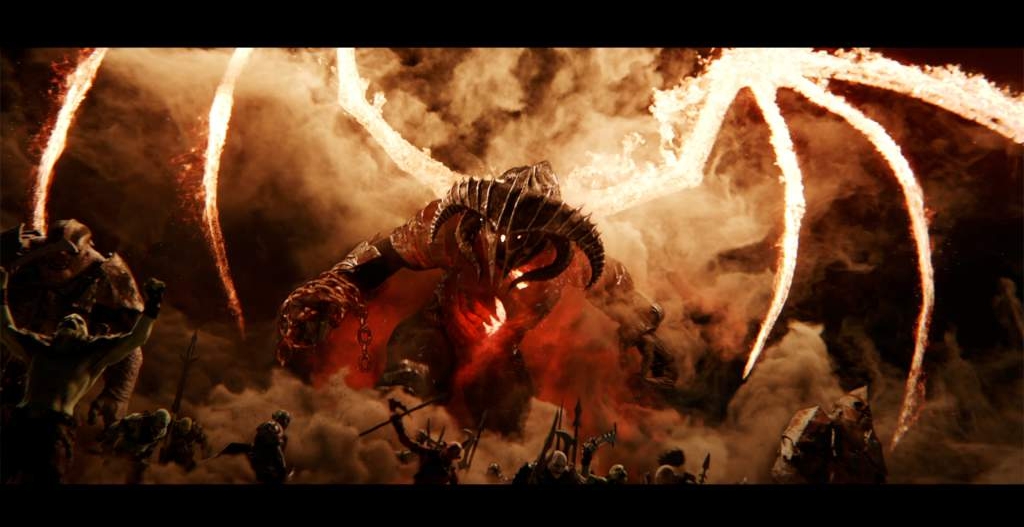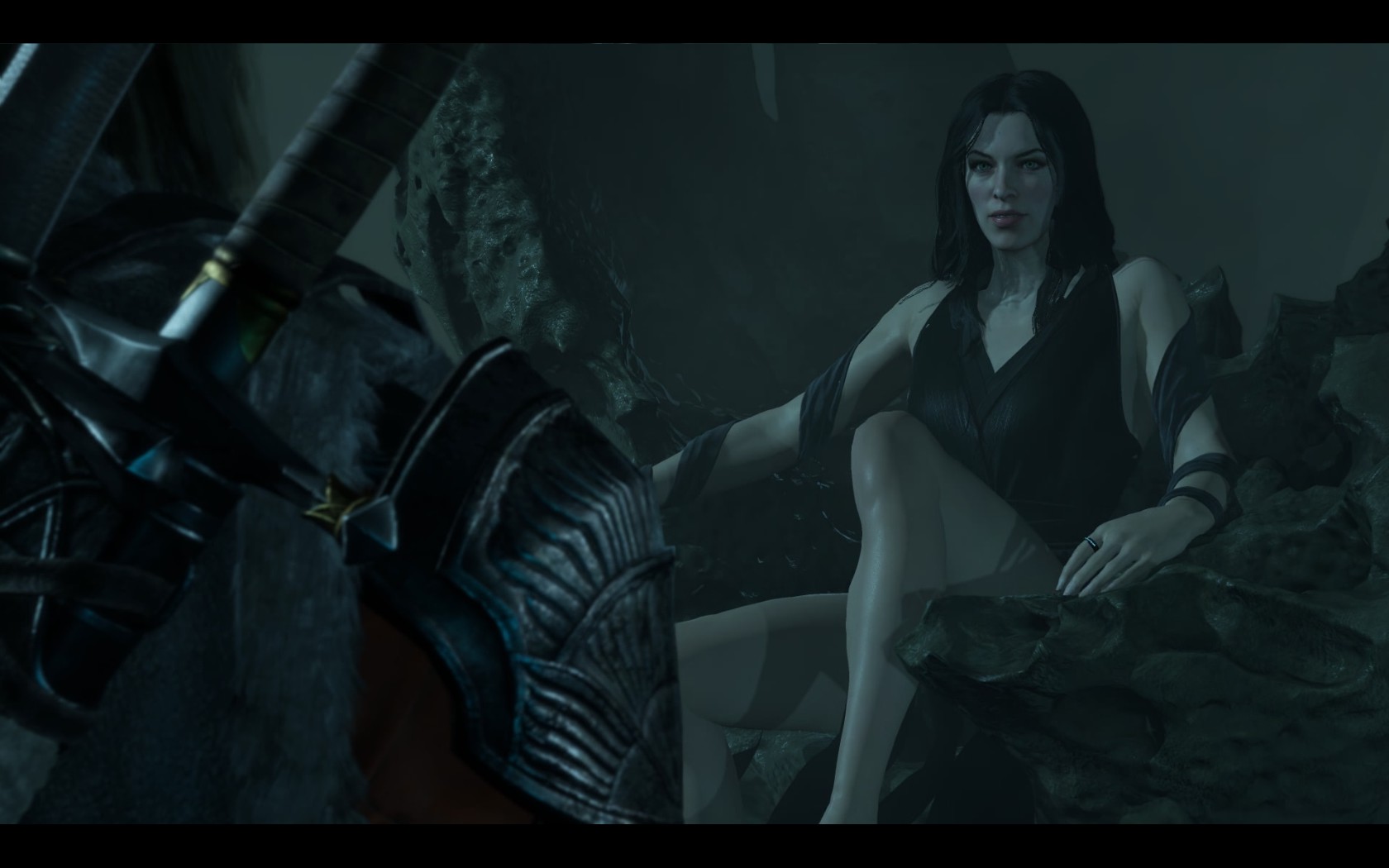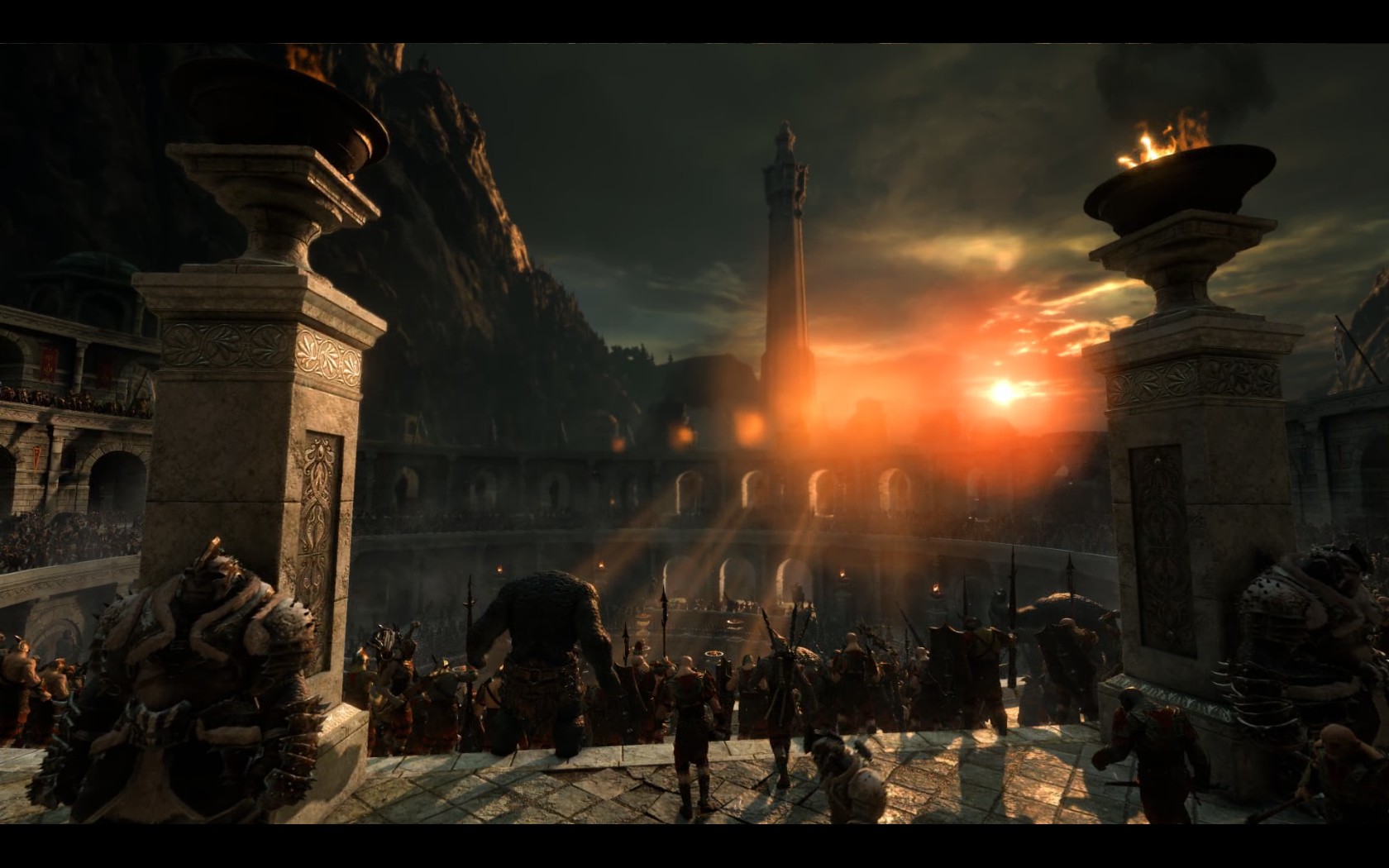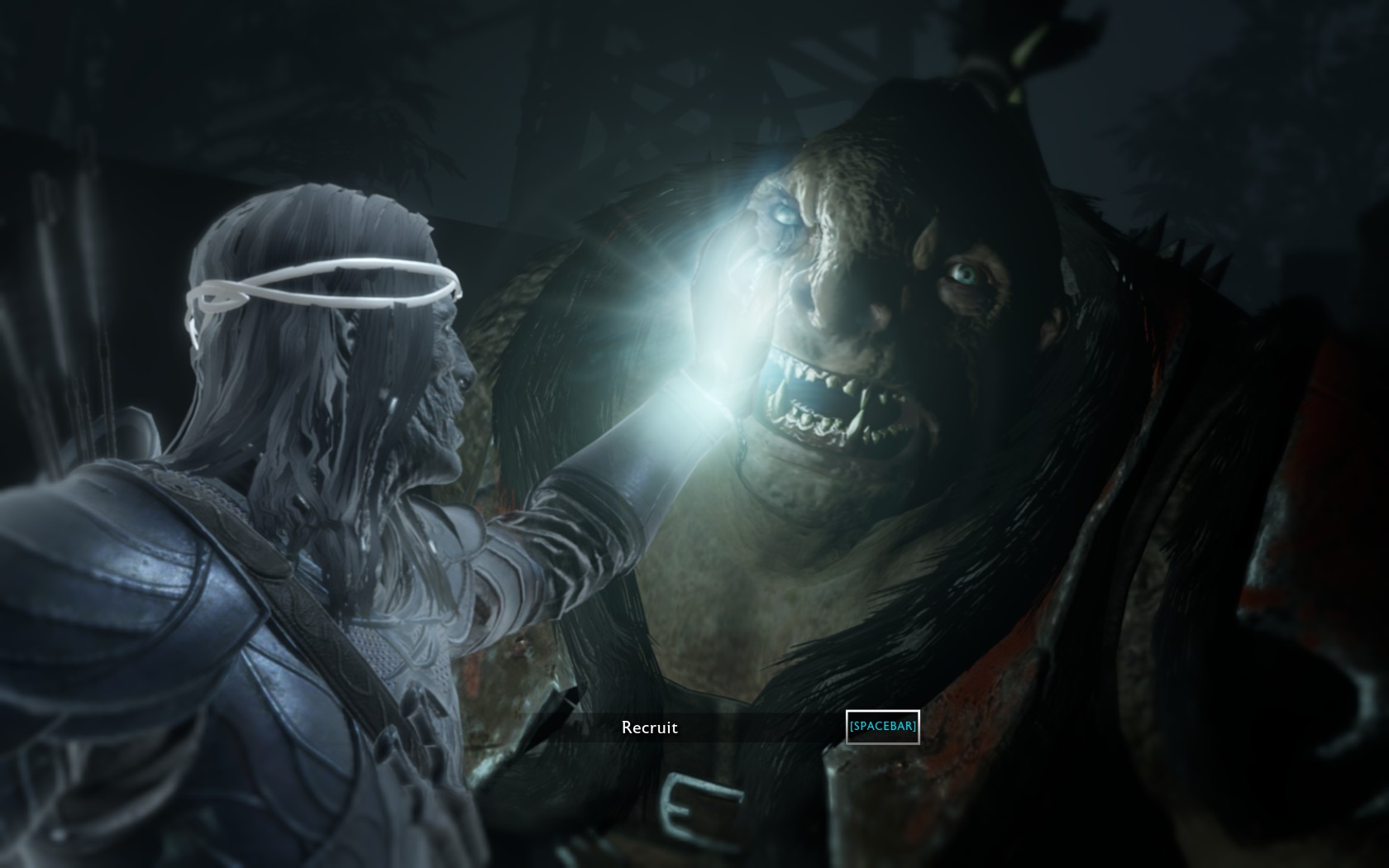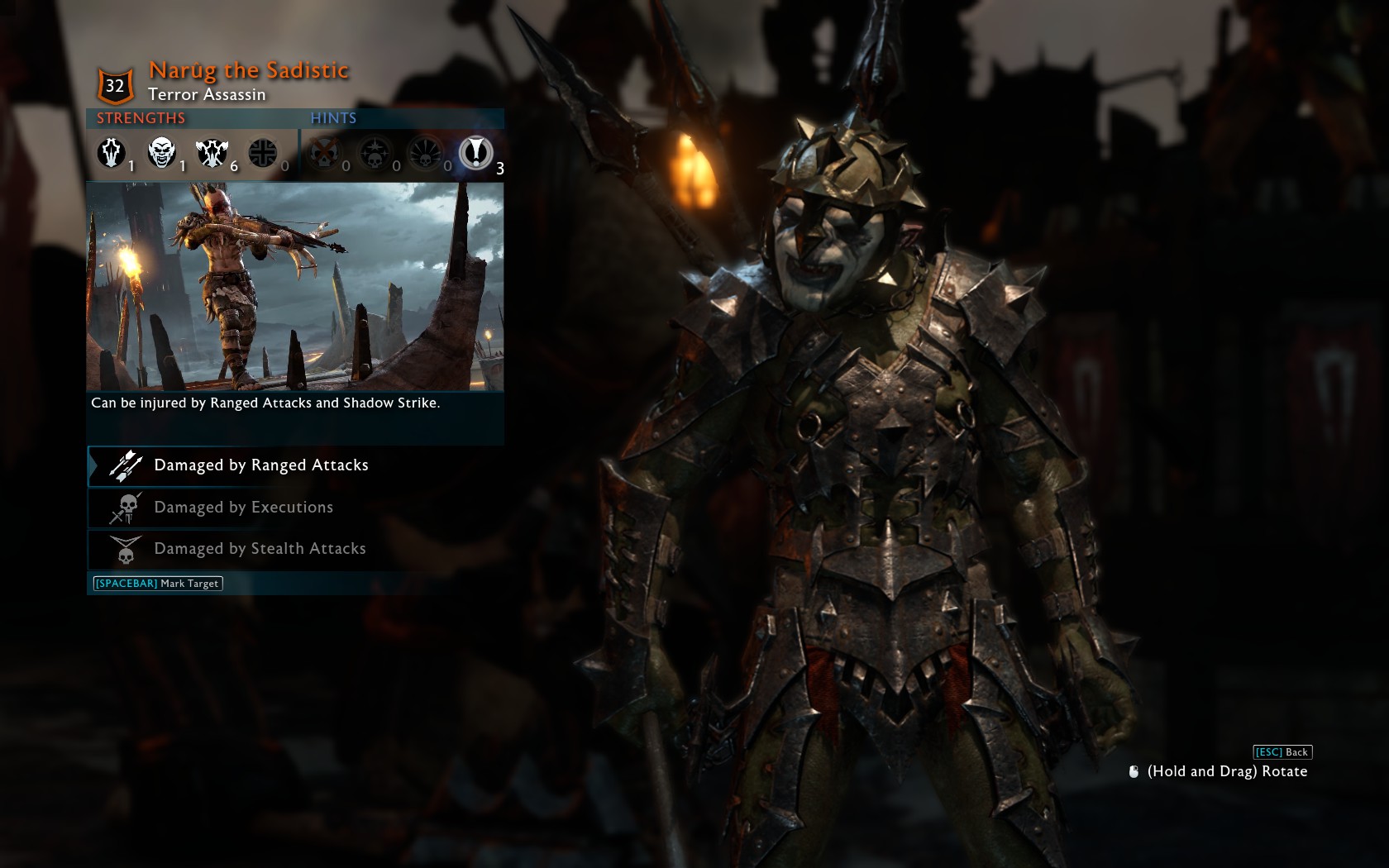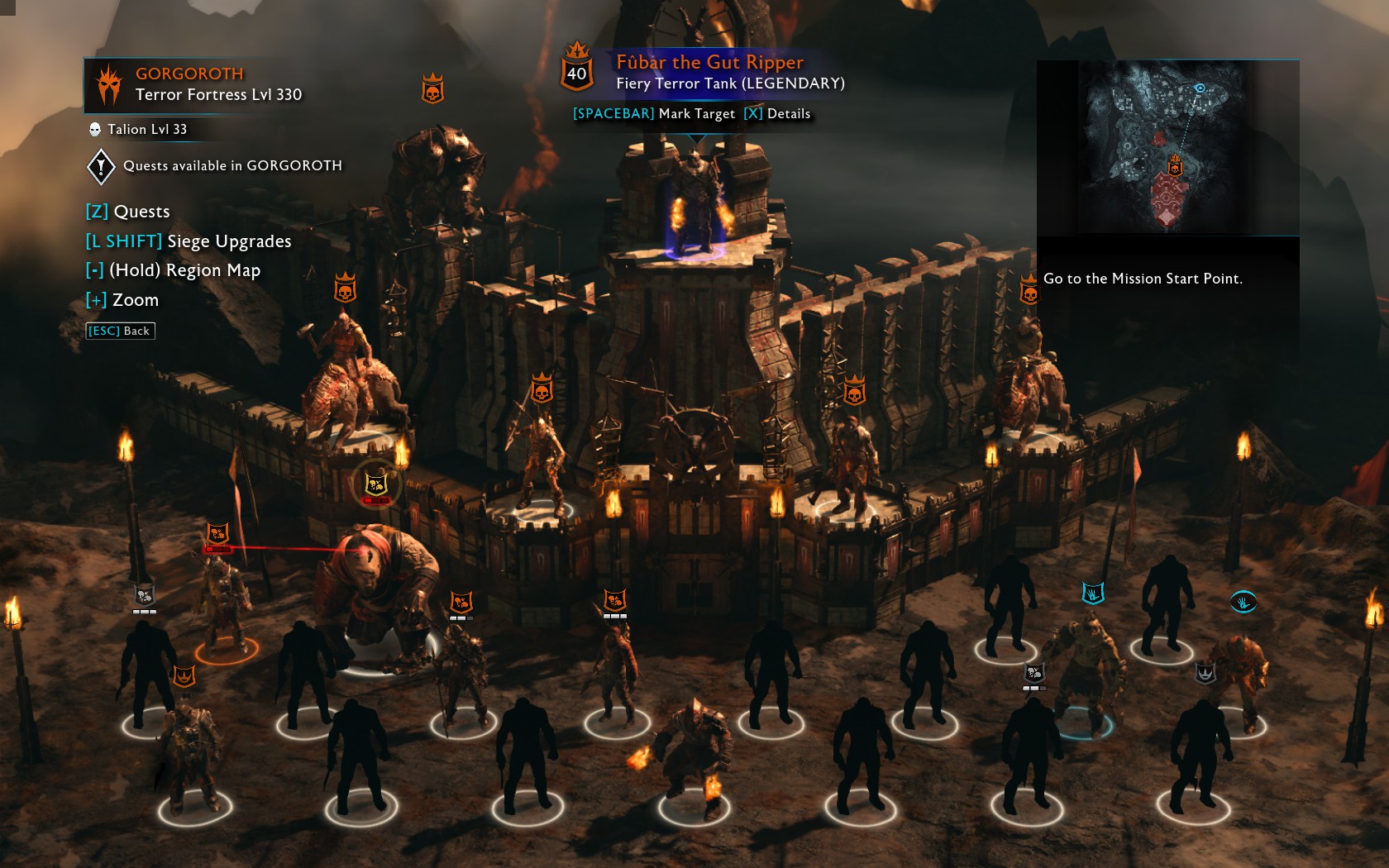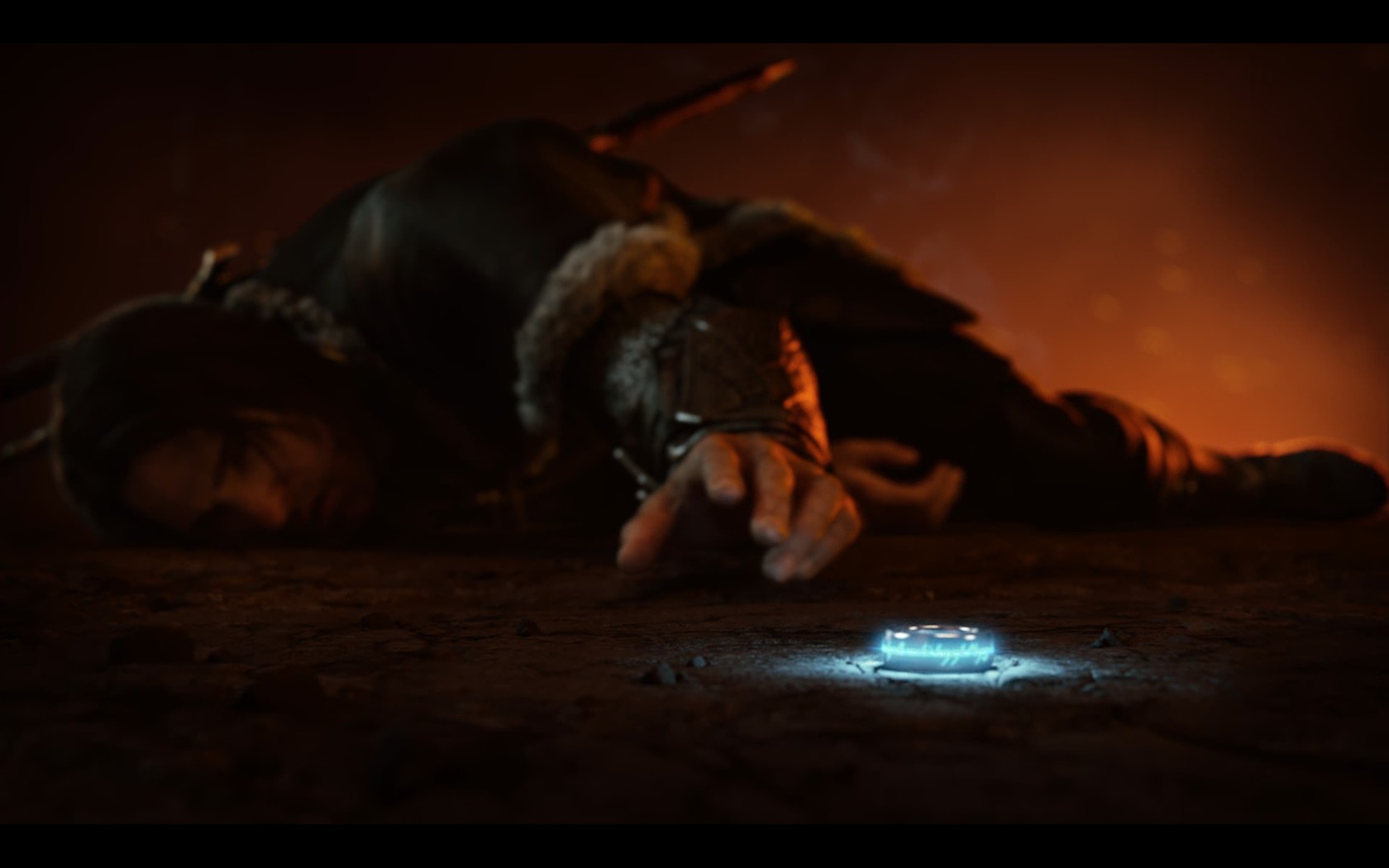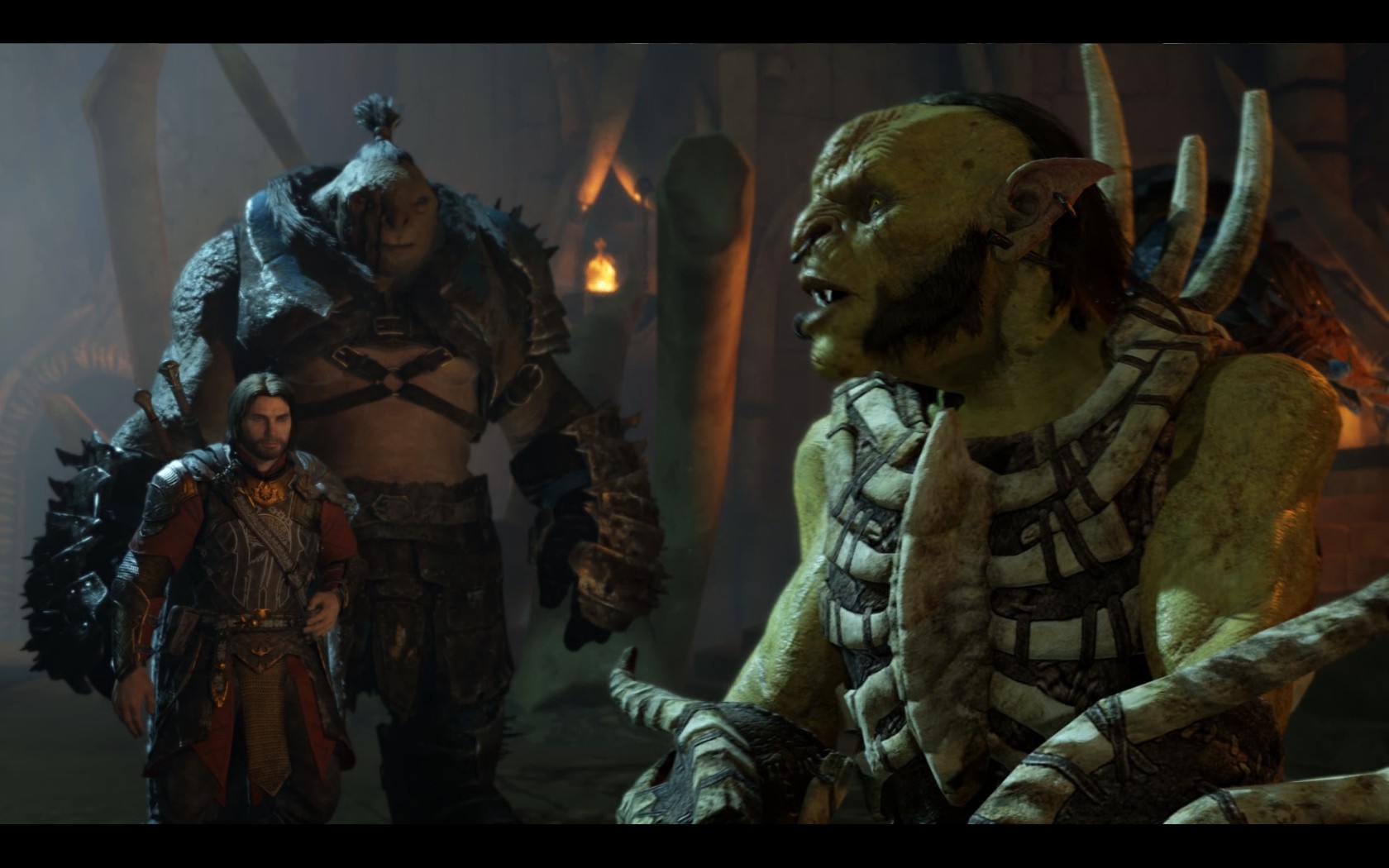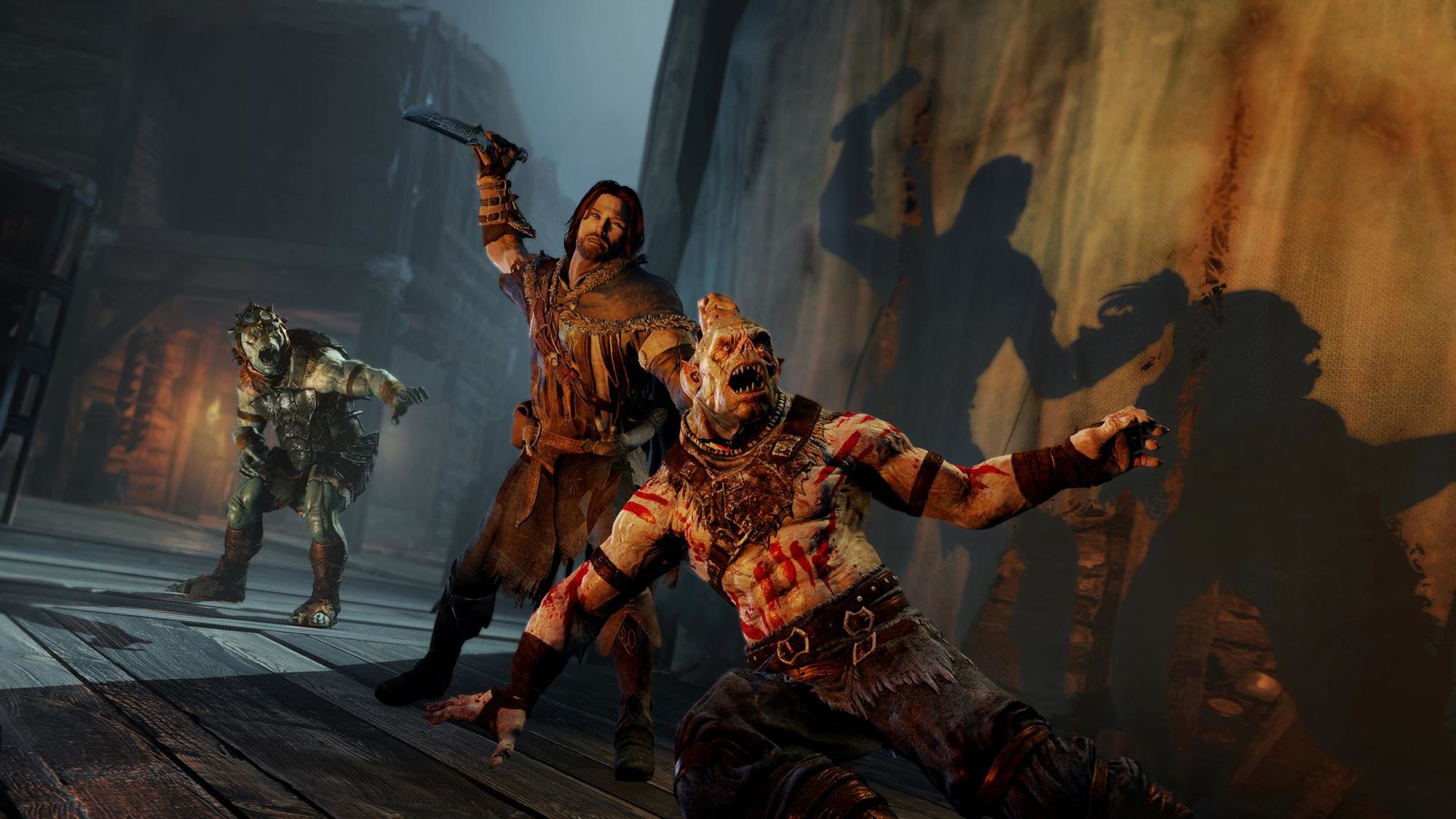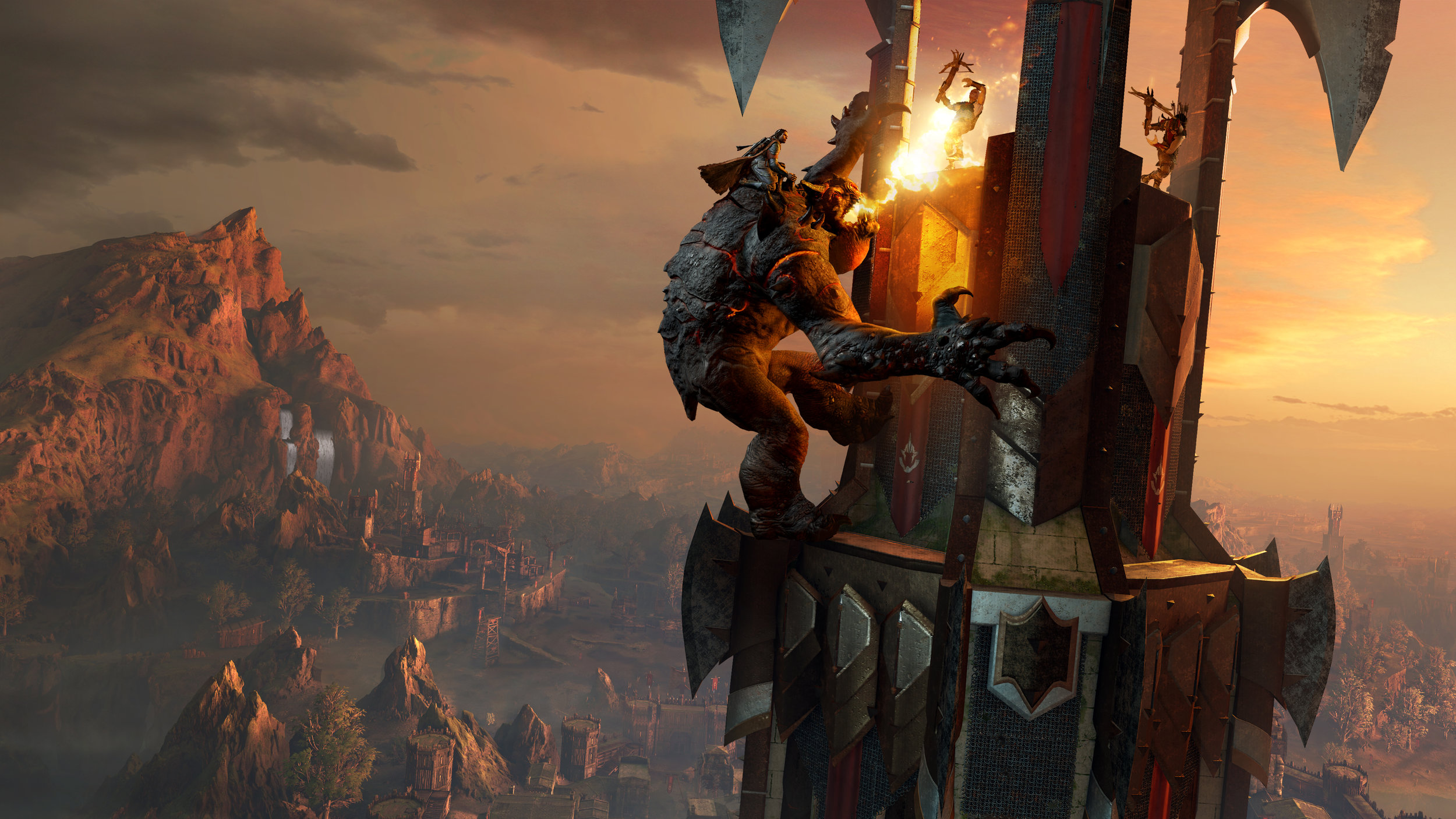When Tolkien created the Lord of the Rings back in 1954 he fashioned one of the most influential fantasy worlds we have ever seen. The effect his works have had on film, literature, stage and now games are incredible. Myself not being a big reader, I will admit that I was only really aware of the Lord of the Rings after it was finally brought to the big screen in 2001. It was from this visual template of the Tolkien world and the Legendarium (Tolkien’s collected works) that Shadow of Mordor was forged. Landing in 2014 from Monolith Productions and published by Warner Bros: it kinda took the gaming world by storm. I remember seeing a little bit of footage and dismissing it as another throwaway third-person action game: oh how wrong I was.
Shadow of Mordor brought a sense of power to the player via its main protagonists, Talion the Ranger and the Elf lord Celebrimbor. While these games don’t interact directly with the story arc of the films: many events (like the forging of the rings) have been touched on. In addition, some of the best characters like Gollum make an appearance and help blur the line between game and film. Talion exists between life and death, his mortal body is sustained by the will of his wraith companion Celebrimbor (the ring maker). Reliving Orcs and Uruki of their vital fluids turned out to be a lot of fun but it was the Nemesis system that really got people talking.
Still set between the events of the Hobbit and Lord of the Rings, Talion now finds himself neck deep in Orcs once more. Our two champs manage to forge a new ring of power in Mount Doom that is free of Sauron’s corruption. Unfortunately, the spider queen, Shelob, has other ideas and forces Talion to hand over the goods by holding Celebrimbor hostage. For some reason Shelob can now transform into a super hot brunette with a fondness for clingy lace numbers: I guess if Yoko Taro can sexualise his characters, why not Middle-earth.
Cause and effect
Nemesis was the Greek goddess of retribution but in the context of our review, it refers to a system that runs at the core of this title. In many games, you are presented with a hierarchy of your enemy which you then work through from bottom to top. The Nemesis system made things far more dynamic and let you, the player, see the ramifications for events in battle. The idea that any lowly grunt can gain infamy from killing you and become your most dangerous adversary is pretty unique. Let’s say you set an Orc Captain on fire but he escapes: that Orc may then return more powerful but with a fear of fire and a few scars for good measure. You can then exploit this fear in your next fight with fire-based attacks and once he’s crippled with terror you can finish him off. In Shadow of War Orcs are randomly generated and so you never really know what you’re going to get. Once you become aware of an Orc captain you should then seek to learn their strengths and weaknesses by interrogating lesser Orcs or finding parchments. There are many traits to consider and each will affect your approach, some will fear Morgal Flies, one might be invulnerable to ranged attacks and the list goes on. In addition, as an Orc survives more confrontations they will gain more traits and even bodyguards.
The Orcs being, well Orcs, will also fight among themselves. These events scatter the map and you can dive in to influence the outcome. One captain might be planning to execute another but you can make sure the tables are turned. You can even send your own Orcs to the fight-pit to train them up. In a way you are almost cultivating the Orc hierarchy in the direction you choose: but things often go hilariously wrong with well-laid plans. The variety of reactions in Shadow of War is also far greater, even when you send a death threat you can then get that Orc coming to ambush you. I have to say the Orcs are the star of the show: each seems to have their own depraved personality and even better, what they say fits with what they are known for. Even after getting to the thirty-hour mark I was coming across new Orcs that were genuinely amusing, even ones that just appear to criticise an action you have taken. One little niggle I have come across is that because the game is so easy, to allow an Orc to gain infamy or gain rank I almost have to let them kill me which makes the process feel a little contrived.
‘One ring to rule them all’
My first ten hours of Shadow of War felt like a slightly better version of the first game, but then things start to shift into a higher gear. Once you gain the ability to control other Orcs the game once again opens up a whole other metagame. Like in Shadow of Mordor, you can place your mark on Orcs to gain their loyalty and this can also be done with Orc Captains. Once these characters are on the payroll you can give them their assignments: think Fightclub but for Middle-earth. They can be told to ambush another captain, seek to infiltrate a Warchiefs bodyguard or even be assigned to watch your own back.
A huge new addition to Shadow of War is the ability to attack and win fortresses. These are missions within themselves and open up once you have weakened the Warlord by running amok outside the walls. This seems to me like a fantastic way of taking the Nemesis system forward and giving you another reason to seek out the best captains for your army. You can buy upgrades for your attacking captains which will give them distinct roles in the siege. Once the event kicks off you must get inside, secure a few strategic points and then take on the current Warlord. For me, I thought these battles were amazing and given how many moving pieces there are they work very well. You can lead the charge, ride a Graug to smash the doors in or sneak over the battlements and strike from above. The only downside is these missions can get a bit repetitive over the course of the game but this shouldn’t be a problem if you enjoy the combat.
Hack and Slash
So when you’re not playing Game of Thrones with the Orc army how does the action chalk up? The original game took on an Arkham style combat system with attack/counter being the bread and butter. When facing groups Talion can either use the very generous stealth system or go in waggling his big sword around. Hacking and stacking Orcs is extremely fun and for me rarely gets old: this is a good thing because you’ll be doing a lot of it. Talion's skill set has also been expanded to a very impressive level with many tricks returning from the first game. In addition, you can now spend skill points to upgrade a base skill with a bonus effect. I like the fact that only one upgrade can be active because this forces you to think about your choices. One of my favourite skills so far is the Sparrow shot which allows you to slow down time in midair and fire your bow: this is as close to being Legolas as you will ever get. In fact, this time around your mobility is off the chain. I also like the various challenges you find on each map, these usually test you on a specific skill that Talion has and while completion is not required I found them pretty fun to take on. Depending on how well you do these are also a great way to pick up skill points early on in the game. There are also other collectables that are revealed by a fairly piffy tower mechanic: these include fragments of Shelob’s memory and rare objects which come with some well-narrated background to Middle-earth.
Once you have the Elven Light skill talion runs around like Billy Whizz and climbs faster than a monkey with its arse on fire. I absolutely love the double jump because this makes traversing the many environments feel so exhilarating. The overall climbing mechanic has been refined this time and this makes slinking around the various structures far more satisfying. I also love how much more agile the Caragors are now as you can balance on wires and perch on points waiting to pounce. I do think that the stealth is way too forgiving because sometimes you can literally run past an Orc and still not get detected. This diminishes the risk of sneaking which is a shame.
As with Shadow of Mordor, you can ride beasts and this time we have a new addition to the stable. The drakes that the Nasghoul tool around on are now also available if you can manage to get on one. This is made infinitely easier once you have the ability to mount a broken beast from range. I have to say that while I like how the drakes can barbecue an entire platoon of Orcs in seconds: they are awful to control. I wish the devs had spent a little more time working on this because right now it’s like trying to drive a blimp using your feet.
The loot system has also been given an overhaul with more item slots and a deeper experience all around. As you pick up different items you will see they have both tiers of rarity and a level. Some of better loot also comes with its own quest objectives which can give the weapon itself traits when completed. Old armour and weapons can be broken to into the game's currency to spend on other purchases. On top of that, each item slot has one open gem space in which you can slot the three colours of gem (each has a varied effect depending on the item). Once you have three of a gem type these can be fused together to make one of the next tier of gem. There are even legendary item sets to collect which will level up with you over time. The whole system is great and I’m glad its there. I guess others could find it bothersome and an unwanted distraction from the action.
Show me the money
Ok time to address the monumental elephant in the room: loot boxes and Micro-Transactions. Has someone ever done you a huge favour and then ruined the ride by asking for money? Have you ever been to an amazing theme park but felt like the entire place is designed to soak up your money? It kinda jades the good feeling you had. Long before release, Shadow of War was being criticised because despite this being a single player game it contains loot boxes and gives players the ability to buy them with real cash. I’ll make my position clear: full priced single player games should not have these mechanics and the fact they do really pisses me off. We are going through a sea change in the games industry and developers (and more so publishers) are refining the way they extract money from our wallets. The days of buying a game outright are slipping away as we head into a more service-based model: this is terrible for gamers and fantastic for the coffers of game makers.
These boxes contain gear and new Orcs of varied rarity. So how have I found the game and did I ever feel I was being pushed to purchase a few loot boxes? I do believe that in some rare circumstances micro-transactions can enhance a game you love, however, I also believe that many greedy publishers feel they’ve been given carte blanche to put them in everything. What makes matters worse in the case of Shadow of War is that the fourth act of the game seems to have been stretched out to last way too long. In order to complete this act and see the true ending, you need to recruit a number of Legendary Orcs which takes many hours. Even for someone like me who loves the gameplay, this became a slog and took something away from my overall opinion of the game. I don’t know of course, but I would bet some serious cash this was done with the knowledge that some gamers would spend real cash in the marketplace to avoid this grind. I personally would rather hack my left nut off with a dessert spoon than pay for loot boxes.
Make no mistake, this could be very bad for the games industry unless we stand up and make ourselves heard (with our wallets). Please, do not buy loot boxes or encourage this flagrant exploitation of our love for games. I’ll be writing an article on this soon so watch this space.
Is it PC?
Even though the first game is a few years older there are some graphical elements that seem superior, which of course is bobbins. Don’t get me wrong, Shadow of War can look stunning but way too often I have been surprised by how poor some assets look. Things like washed out wall textures, low detail Orc faces and even the gore doesn’t look as sticky as it once did. It is worth noting that I while all my settings were on highest, I did have to run the game at slightly lower texture setting (high) so this could be the reason. Technically the game runs great, I’ve been getting a good 30-40 frame rate on my ageing 980 GTX and even fort sieges run very well.
One thing that has really baffled me is how different Talion's face is, it now looks like he’s been hanging around the Botox clinic a little too much. There is more detail on his features but at the same time, it seems notably less expressive than the Talion in the first game. As I have mentioned, the Orcs are brimming with personality and one, in particular, is very well animated. Coupled with this is some of the best voice acting in the game, maybe a little too comedic for some but I thought it was great.
As you would expect you have the option of controller or mouse/keyboard. This isn’t even a choice for me as the latter gives a greater degree of control when changing direction on a wire or spinning your camera around in a heavy fight. One complaint in terms of the controls is how keys bind. Often one key is set for multiple actions and this cannot be changed. So in some circumstances, you will end up with Talion doing the wrong action, however, this wasn’t as big of an issue as I thought it was going to be.
As I have mentioned the Orc voice acting is excellent but the same cannot be said for the various human voice actors. It’s not that they are particularly bad, just they aren’t stand out either: but then much of this dialogue is throw away padding. Sound effects are great across the board, from the way metal meets bone as you shiv an Orc in the neck to the meaty explosion from grog-containers. I also enjoyed the music and how it certainly fits with what I remember from the films: moving between dramatic orchestral pieces during sieges to a more whimsical Irish folk music feel for the game map.
Summary
I am a huge Shadow of Mordor fan and so it follows that I would also love Shadow of War (and I do). The team at Monolith have improved almost every aspect of the core gameplay and given us a far bigger slice of Middle-earth to play with. We have a lot of game here and the world is brimming with things to get stuck into. The real question is, will you enjoy these things like I have? I personally love the combat and messing with the Nemesis system. However, if you get bored of this early on it’s unlikely you’ll ever see act four. Shadow of War would very easily pass as a Ubisoft game due to its icon littered maps and if I’m honest most quests boil down to killing an Orc Captain while killing a few lesser Orcs in a certain way.
Ok, full disclosure: I’m not a big fan of Warner Bros due to the way they do business. The state of Batman Arkham Knight on PC and the way they paid YouTubers for favourable coverage of Shadow of Mordor have something to do with this. A major problem is that Shadow of War has received so much bad press in the run-up to release, it is difficult to distinguish the bad feelings from genuine criticism. So here’s the thing, if I strip away all the negative press, the appalling way the Michael Forgey DLC was handled and the fact this game contains loot boxes: I could heartily recommend you buy Shadow of War. I guess the big question for you is, how much do these other elements put you off playing an excellent game? If you do want own it at some point I’d wait for the next Steam Sale where you will be able to pick it up for a fraction of the cost.
I will end my review with a simple message to Warner Bros and any other major publisher out there starting to use exploitative micro-transactions. Gamers are getting sick of being treated like cash piñatas, you are losing loyal customers by being greedy while also being so blasé about it. Please pack it in and stick to making amazing games.
